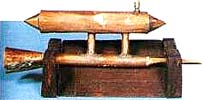The Greek fire
< previous | next >

Liquid fire. It is also called "Greek
fire", "Sea fire ", "Persian fire "
Greek, or liquid fire The Byzantines' most important weapon,
which played a decisive role in all naval operations, was "Greek"
or "liquid fire". It consisted of a developed recipe of older chemical
compounds attributed to Kallinikos, a 7th-century Greek
engineer from Helioupolis in Syria. Liquid fire contained sulphur,
nitrogen, and naphtha (petrol) and other
substances and put fear into the enemy fleet, since it burnt even
on water.

Byzantine pump for "liquid fire" (reconstruction)
This chemical compound was kept as a state secret. The emperor
Constantine VII Porphyrogennitos, addressing his son and heir Romanes,
stressed the secret nature of the composition even stating that
it should not be learnt by allies.
He continues: "the ingredients were disclosed by an angel
to the first great Christian emperor, Constantine ... and that
great emperor, wishing to secure the secret for his successors,
ordained that they should curse, in writing and on the Holy Altar
of the Church of God, any who should dare to give this fire to another
nation, that he should not be counted amongst the Christians, neither
should he hold any rank or honour and if he happens to have one
already, let him be deposed and paraded like a common criminal throughout
the centuries, whether he be an emperor, a patriarch or any other
lord or subject; whosoever should attempt to disobey this order."
The liquid fire was kept in storehouses of the capital and at various
strategic locations. Its constituents were kept secret for many
centuries, until the Arabs learnt them.
< previous | next > |